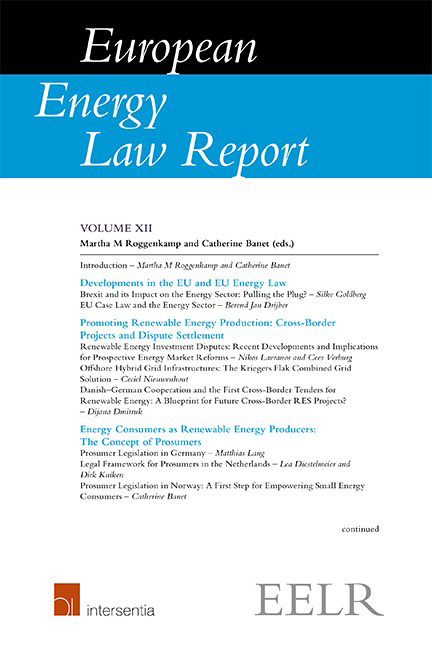Book contents
- Frontmatter
- Preface
- Contents
- List of Abbreviations
- List of Contributors
- Introduction
- PART I Developments In The EU and EU Energy Law
- PART II Promoting Renewable Energy Production: Cross-Border Projects And Dispute Settlement
- PART III Energy Consumers As Renewable Energy Producers: The Concept Of Prosumers
- PART IV Balancing Renewable Electricity Production Withsupply Security: National Experiences With Capacity Mechanisms
- PART V Promoting The Use Of Sustainable Gas And Security Of Gas Supply
- Chapter XII The Use of Power-to-Gas in Refineries: Regulatory Challenges from an EU and German Perspective
Chapter XII - The Use of Power-to-Gas in Refineries: Regulatory Challenges from an EU and German Perspective
from PART V - Promoting The Use Of Sustainable Gas And Security Of Gas Supply
Published online by Cambridge University Press: 31 January 2019
- Frontmatter
- Preface
- Contents
- List of Abbreviations
- List of Contributors
- Introduction
- PART I Developments In The EU and EU Energy Law
- PART II Promoting Renewable Energy Production: Cross-Border Projects And Dispute Settlement
- PART III Energy Consumers As Renewable Energy Producers: The Concept Of Prosumers
- PART IV Balancing Renewable Electricity Production Withsupply Security: National Experiences With Capacity Mechanisms
- PART V Promoting The Use Of Sustainable Gas And Security Of Gas Supply
- Chapter XII The Use of Power-to-Gas in Refineries: Regulatory Challenges from an EU and German Perspective
Summary
INTRODUCTION
The impact of climate change concerns on the energy sector is undisputed and has led to various governmental initiatives to limit greenhouse gas emissions. Since the 1990s a wide range of measures and instruments have been developed on EU and national level to combat climate change. In the EU these measures vary from the introduction of a CO 2 emissions trading regime to the promotion of renewable energy sources and energy efficiency measures. These measures have a direct impact on the fossil fuels sector and the electricity generation sector. One of the sectors that will be affected by these changes is the refinery sector. Oil refineries transform crude oil into a range of usable products such as liquefied petroleum gas (LPG), petrol, kerosene, jet fuel, diesel oil and fuel oils. It is an energy intensive process and refineries consequently also emit large quantities of greenhouse gasses, in particular CO 2. In order to reduce greenhouse gas emissions, the EU has put in place a range of instruments varying from an EU emissions trading system (EU ETS) to measures focusing on energy savings and energy efficiency (including the use of waste heat), as well as the possibility for carbon capture and storage. Apart from reducing greenhouse gas emissions, there are also other attempts to make the refinery sector more sustainable by using ‘green’ hydrogen instead of natural gas in the refinery process.
So far little has been written about the impact of these climate goals on the refinery sector: this chapter tries to fill this lacuna by presenting a brief overview of some of the challenges the refinery sector faces and how law can play a role in addressing these issues. It will focus in particular on the need to make the refinery sector and its end product – the transport fuel – more sustainable by using ‘green’ hydrogen instead of natural gas in the refining process. By doing so, the focus will be on the EU and Germany. The reason for choosing Germany is this country's strong focus on energy transition and the large number of pilot projects involving ‘green’ hydrogen.
The chapter will therefore begin with the current EU and German climate policy. This will be followed by a brief description of the refinery sector and refinery process.
- Type
- Chapter
- Information
- European Energy Law Report XII , pp. 251 - 270Publisher: IntersentiaPrint publication year: 2018
- 2
- Cited by

